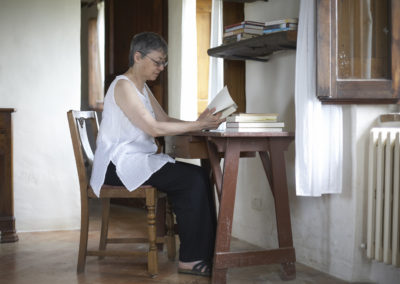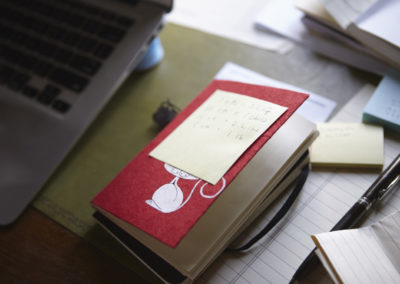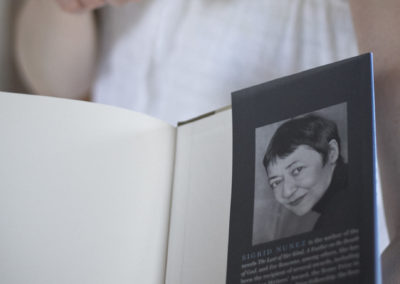Most days during my stay at Civitella began with a long walk in the Umbrian hills. Then I would return to my studio, Castrabecco, and work on my novel in progress. Many authors have drawn an important connection between walking and writing, and I was often delightfully reminded of these words of the poet Mandelstam: “I wonder how many pairs of sandals Dante wore out while working on the Commedia.”
Preface to an Autobiography, originally published in The Threepenny Review
I like the way Rousseau declares in the first sentence of his autobiography that he is about to do something that has never been done before and that will never be done again.
The problem with any first sentence, says Joan Didion, is that you’re stuck with it. Everything else is going to flow out of that sentence. And by the time you’ve laid down the first two sentences, your options are all gone.
Before beginning, too many options. Then, in the next breath, none.
When you can’t sleep, goes an old cure for insomnia, start telling yourself the story of your life. For some reason, writer’s block has always felt to me like a kind of insomnia.
I like that Norman Mailer said there’s a touch of writer’s block in a writer’s work every day.
I don’t remember who said, Insomnia is the inability to forget.
When you’re having trouble writing, get up, go out, take a walk in the street. You will discover that certain streets exist precisely for this purpose. Once, I saw a man— homeless by the look of him—digging through the trash. He pulled out a couple of sheets of newspaper, examined them, and threw them back. Fishing deeper, he hauled up a magazine, squinted at the cover, and threw it back. Shit, he said, walking away. There ain’t nothing to read in these fucking cans anymore.
Rousseau goes on to say that he has embellished the story of his life only to fill a void when his memory failed. But, of course, he never gives you the head’s up.
Never write I don’t remember, Editor says; it undermines your authority.
But write as if you remember everything and Reader will smell a rat.
I like the student in my graduate fiction writing class who said, I’ve read your novels and there’s one thing I have to ask: Do you make some of that stuff up?
I like that Allen Ginsburg told a teenager who wanted to know what he should write about that he should write about his love for his friends.
I once made the mistake of writing about a love too soon after it was over. Forgetting Chekhov’s advice that you should sit down to write only when you feel as cold as ice.
How can a man who knows nothing about love be a great novelist? a character in a novel by J. M. Coetzee says about a character named J. M. Coetzee.
I like that Virginia Woolf said, Everything I read these days, including my own work, seems to me too long.
That Borges said, Unlike the novel, a short story may be, for all purposes, essential.
But not that Jeanette Winterson said, I think long books are rude.
Not that Céline said, Novels are something like lace, an art that went out with the convent.
More and more, I like the idea of a pen name.
Sugared Nouns was the computer’s suggestion after spell-checking my name.
Some writers use pen names so that they can be more truthful; others, so that they can tell more lies.
I like how Lily Tomlin used to introduce one part of her act: The following skit is about my parents. I have changed their names to protect their identities.
I like the sliver of ice in the heart that Graham Greene thought every writer must have. I have it.
And the grain of stupidity Flannery O’Connor said the writer of fiction can’t do without. I have that too.
I like that Alan Bennett said, For a writer, nothing is ever quite as bad as it is for other people, because, however dreadful, it may be of use.
Oncologist says, That doesn’t sound like any writer I know.
I like John Banville’s paraphrase of Bennett: Writers don’t suffer as much as other people.
There is always a sheet of paper. There is always a pen. There is always a way out, wrote H. R. Mencken. Who nevertheless hoped that his life would not last too long.
Write … paper … pencil are said to have been the last words of the poet Heine.
I like that, at the end of his life, Darwin said he wished that he had read more poetry.
That Keynes said he wished that he had drunk more champagne.
That Chekhov said, It’s a long time since I drank champagne, then drained his glass and died.
I like last words. Beethoven: I shall hear in Heaven. Käthe Kollwitz: Good luck, everyone.
And nutty epitaphs: I know not everyone is unhappy about this.
I wanted to write a comic novel, then realized I had my own life to hand.
Sugared Nouns: My Life and Death as a Writer.
Once you start on the road to autobiography, fretted Calvino, where do you stop?
I can tell the story of my life in just four words. Good times, bad times.
There will always be lacemakers. There will always be convents.
But about you, my love, I will never feel as cold as ice.



